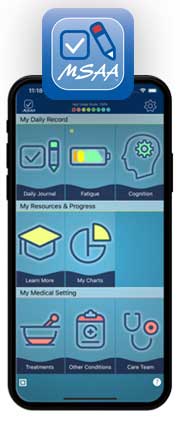Reporting to the Neurologist

We are accustomed to replying to the question, “How are you?” with “I’m fine.” What appears to be an inquiry has actually become a polite greeting; keep it simple, don’t complain.
This sometimes transfers to the doctor/patient interactions. Whether one shows up to an appointment feeling better than usual, or better than last week, or not wanting to share the challenges of complying with treatment plans, it can be tempting to present as a model patient. To be praised for doing what is asked of you can feel good, but this can lead to not getting one’s needs met or underreporting symptoms.
Reflecting on how you feel when visiting the doctor can be helpful. For instance: Are you afraid? Feeling rushed? Intimidated? Unsure of medical terminology? Developing insight, creating a strategy for appointments, and planning for neurology appointments can help decrease stress and provide a full and more realistic picture of symptoms.
In the two sections to follow, helpful tips and strategies are given to assist with preparing for and visiting with your neurologist. These sections explain the importance of accurately recording and reporting symptoms, while providing details on how to ease stress and improve communication.
Accurately Recording and Reporting Symptoms
Fear of disability and change can sometimes interfere with one’s awareness of symptoms. This is a form of denial, and denial can at times be a coping mechanism. However, avoiding or not recognizing symptoms can lead to poor reporting to the neurologist, and this means that the symptoms will not be recorded accurately at appointments, not to mention possible deterioration of health due to untreated symptoms.
Reporting symptoms accurately increases opportunities for healthy interventions and can also help identify if other health issues might be involved, such as regular aging or menopause. Lifestyle changes and referrals to appropriate resources – which include consulting other professionals for physical, speech, occupational, or mental health therapy – can often help to alleviate a number of symptoms and decrease any distress or discomfort.
 Paying attention can be tiring, so simplifying how symptoms are tracked can be very helpful… and there’s an app for that! Using mobile apps can assist in the regular tracking of symptoms, along with keeping a list of questions, so each appointment with a neurologist can be maximized. This can include photos or videos, recorded on your phone, of symptoms that may be observed visually.
Paying attention can be tiring, so simplifying how symptoms are tracked can be very helpful… and there’s an app for that! Using mobile apps can assist in the regular tracking of symptoms, along with keeping a list of questions, so each appointment with a neurologist can be maximized. This can include photos or videos, recorded on your phone, of symptoms that may be observed visually.
One example of an app designed specifically for people with MS is My MS Manager™, MSAA’s mobile phone application, which is provided free of charge to individuals with MS or their care partner to use on their iPhone or Android mobile phone device. Developed in conjunction with @Point of Care, this first-of-its-kind app for MS offers individuals a convenient and effective tool to manage the ever-changing course of the disease.
This special app allows users to track disease activity, store medical information, and generate charts and reports across various metrics such as treatments, moods, and symptoms. Other HIPAA-compliant features include optional private reminder settings, links to further educational materials from MSAA, and the ability to connect to physicians and other clinicians via the app to share progress and reports securely and as needed. For more information, please visit mymsaa.org/mobile.
Easing Stress, Improving Communication, and Finding Support
Medical appointments can be stressful and bringing along a relative or friend to appointments can be comforting. Some MS symptoms such as anxiety and forgetfulness, or the possibility of being too focused on one issue, can reduce one’s ability to remember the answers to questions and instructions given by the neurologist. Including a trusted family member or friend to take notes allows the person with MS to focus on asking questions and listening to answers.
Prior to appointments, you may want to reflect on how you are functioning in all areas of life – including work, family, and hobbies. This can help you to focus on your level of functioning and how some abilities may have changed. By identifying the changes you are experiencing, your doctor will be better able to provide proper treatment for your symptoms. Additionally, this will lead to better recordkeeping, and accurate medical records can be helpful in painting a picture of medical history when asking for accommodations or possibly applying for disability insurance in the future.
Just as workplaces have expectations and norms, doctors and medical centers also have their own systems and procedures in place. Establishing the best means of communication with physicians and the interdisciplinary healthcare team between appointments decreases crisis escalation and supports wellness. Examples of ways to communicate include email, website portal, and speaking to the nurse. Learning when and whom to contact if symptoms become problematic can be helpful. As with any relationship, communication can be challenging, so knowing how to best communicate and having a system set up in advance when life is calm can be important.
Understanding the policies for requesting medical records can also preempt urgency and avoid a crisis. Clinics and physicians have varying policies and costs related to copying medical records, so by being proactive and not procrastinating, undue urgency can be avoided.
Educational programs, support groups, online communities, and other resources for bringing people together and understanding the symptoms and changes related to MS are available to members of the MS community. Decreasing isolation and increasing knowledge can promote a healthy lifestyle and develop important coping skills. A wealth of information is also available through websites, educational videos and webinars, publications, and more. Along with other organizations, MSAA provides many vital resources to the MS community. For more information, please visit mymsaa.org or call MSAA’s Helpline at (800) 532-7667.
